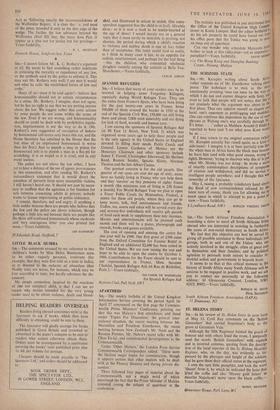SIR,—I cannot follow Mr. K. C. Rothery's argument at all.
He seems to find something rather indelicate in criticising the morality or expediency of any law, or the methods used by the police to enforce it. This may suit Mr. Rothery very well; I am sure it would suit what he calls 'the established forces of law and order.'
Many of us—must it be said again?—believe that homosexuality should not in certain circumstances be a crime. Mr. Rothery, I imagine, does not agree, but he has no right to say that we are putting anyone above the law. We suggest rather that some actions by some people do not come within the scope of the law. Even if we are wrong, and homosexuality should or could be dealt with by prohibitive legisla- tion, imprisonment is not the way to do it. (Mr. Rothery's own suggestion of corruption of hetero- by homosexual cell-mates only bears this out, and the Home Secretary has admitted in the House that the last state of an imprisoned homosexual is worse than his first.) And to punish a man in prison for homosexual acts is to punish a man in a flea-pit for scratching; it is as stupid as it is cruel, and in any event useless.
The police are not above the law either. I have yet to hear a defence of the use of agents provocateurs in this connection, and after reading Mr. Rothery's extraordinary statement that it would divert the attention of perverts from more susceptible victims, I still haven't heard one. It should not now be neces- sary to reaffirm that the agitation is for freedom for acts between consenting adults in private; nobody wants to license importuning or public indecency.
I remain, therefore, sad and angry; if anything a little sadder because there are people who believe that the law and the police are above criticism, though perhaps a little less sad because there are people like the three self-confessed homosexuals whose moderate and very courageous letter you also printed last week.—Yours faithfully,
IAN SAINSBURY 20 Edgedale Road, Sheffield, 7










































 Previous page
Previous page